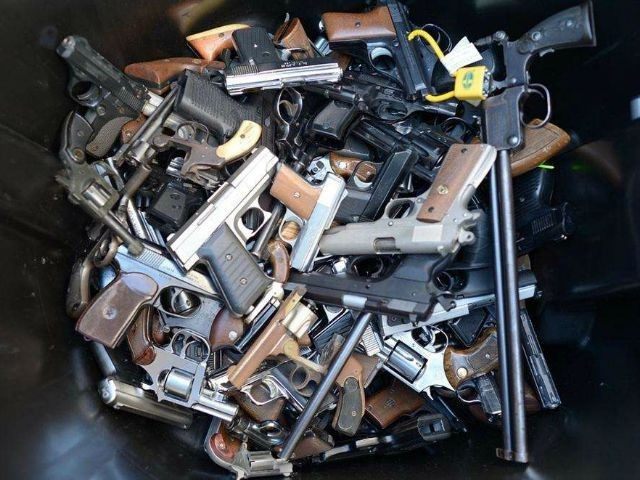SACRAMENTO, Calif. (AP) — An additional $24 million that was supposed to end the backlog in a unique California firearms seizure program has reduced the waitlist only about 40 percent, according to a report released Monday.
That leaves a backlog of nearly 13,000 gun owners who bought firearms legally but were later convicted of a felony or a violent misdemeanor, became subject to a domestic violence restraining order or were determined to be mentally unstable.
Officials said the extra money in 2013 would let Attorney General Kamala Harris’ office end a backlog of nearly 21,000 people within three years.
The remaining backlog of nearly 12,700 gun owners is the lowest it’s been since 2008, Harris said. The report she released Monday cites recent expansions of the state’s gun control laws for the continued backlog.
Harris, a Democrat who is running for the U.S. Senate this year, called the results “historic reductions” and “historic achievements” in the face of an increased workload, but lawmakers of both political parties expressed frustration at a hearing last year.
“She’s taking a victory lap and she should be holding her head in shame,” Sen. Joel Anderson, R-Alpine, said Monday. “They seem to think it’s a good thing and I think it’s outrageous.”
The additional money runs out in May, and Harris now wants lawmakers to make permanent the funding that was initially given her office after a series of mass shootings, including the Newtown, Connecticut, school massacre.
Her office had spent about $14.4 million of the $24 million by October, but she argued the 9-year-old program needs the budget extended past three years because of an increased workload.
That includes a state law that took effect this month that lets family members ask judges for restraining orders if they question a relative’s mental stability. Harris projected the law could add as many as 3,000 people to the state databases.
The state also added rifles and shotguns to state databases that previously only included handguns, she said. Harris’ state Department of Justice cross-matches five databases to identify those whose guns may be seized. Including the long guns since 2014 roughly doubled the number of individuals who might face ownership prohibitions as the department sorts through more than 930,000 firearms sales each year.
That plus increased gun sales added about 12,500 people to the list in the last 2 years as the department struggled to control the backlog.
“We gave them a great deal of money a few years ago. We were initially disappointed in the results,” said Sen. Loni Hancock, D-Berkeley, who heads the Senate Public Safety Committee and the budget committee that oversees public safety spending. The department may be improving, she said, but lawmakers will examine whether permanent funding can come from within its existing budget.
Sen. Bob Huff, R-San Dimas, said Harris hasn’t shown she can deliver the promised results.
“Just to open up the checkbook…that doesn’t do it for me,” he said.
Harris reported that nearly 19,000 investigations were conducted under the program in the last 2 years, resulting in the seizure of 335 assault weapons along with about 9,400 handguns and long guns.
The department previously said the temporary nature of the jobs meant that many agents trained for the program soon left for other permanent jobs. Now agents must stay in their original job two years before they can transfer, according to Harris’ report, but about a quarter of agents’ jobs remain vacant.

COMMENTS
Please let us know if you're having issues with commenting.